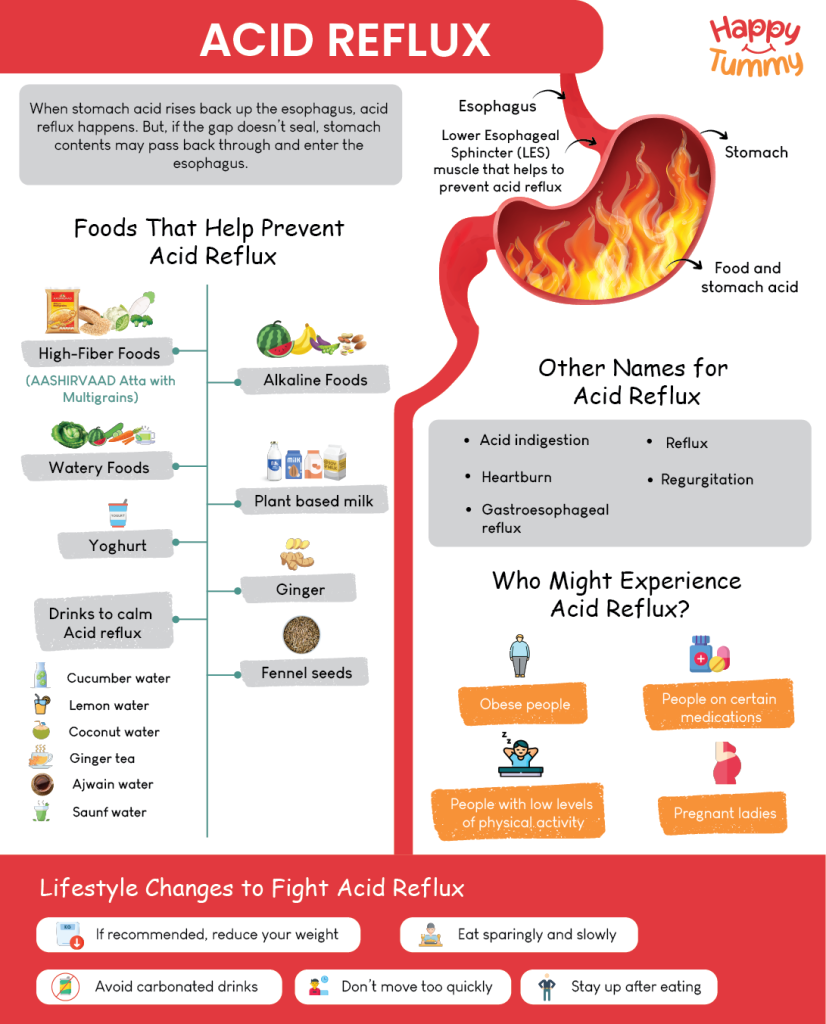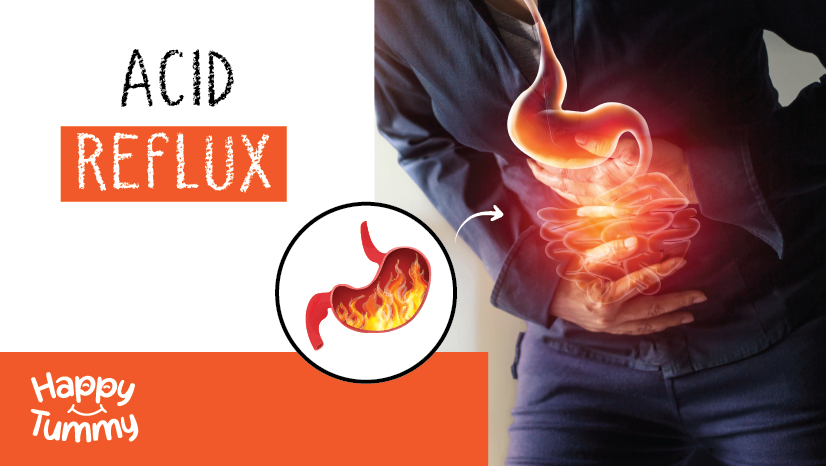Table of Contents
Have you ever experienced spiciness or burning in your mouth following consuming a big feast or chili foods?
It can occasionally feel like a tingling pain in the chest and upper abdomen. You lay in bed. Nonetheless, you continue tossing. You’re turning. Your chest hurts and is on fire. This is nothing but acid reflux. Hence, if you have heartburn, you know how uncomfortable it may be.
Acid reflux, often known as heartburn, is characterized by a burning sensation in the chest or neck and has nothing to do with your heart.
Most people generally experience acid reflux on rare occasions, which usually results in brief pain following a meal.
Some experience heartburn that is so severe and persistent that it begins to compromise their health and way of life. If you fall into the first category, treating heartburn may be as easy as consuming a healthy diet and altering your lifestyle.
What is Acid Reflux?
When stomach acid rises back up the esophagus, acid reflux happens (The muscular, hollow tube that carries food and liquid from your throat to your stomach is called the esophagus). It is about 10 inches long and serves as a component of your digestive tract.
Food passes from the mouth down the esophagus when you eat.
Food can pass into the stomach through a hole between the esophagus and the stomach. The opening closes when food has been delivered. But, if the gap doesn’t seal, stomach contents may pass back through and enter the esophagus. That is acid reflux.
When the acid builds, a person will experience a burning feeling in their stomach. Many symptoms may result from this, which can be unpleasant.

Other Names for Acid Reflux Include:
- gastroesophageal reflux
- reflux
- heartburn
- acid indigestion
- regurgitation (the action of getting swallowed food up again into the mouth)
The majority of people will occasionally have acid reflux. They occasionally won’t even notice it when it occurs.
Acid reflux may occasionally be minor and occur after heavy foods.
Other times, acid reflux could happen more often. There may be a condition called gastroesophageal reflux disease (GERD) if heartburn happens twice or more each week for several weeks. [1]
An ongoing ailment called GERD manifests as acid reflux. Acid reflux and GERD are not the same. Acid reflux symptoms that last for a while are an indication of GERD.
Foods That Help Prevent Acid Reflux
It may seem fascinating that your body is home to many vitamins and minerals, but researchers are slowly learning how to control these healthy ecosystems to enhance human health.
Some meals include beneficial nutrients that can provide comfort if you have experienced heartburn or are dealing with other gastric issues.
The good news is that you can eat various foods to help prevent acid reflux. Stock up on the following types of food in your kitchen:
1. High-Fiber Foods
Fibrous foods give you a feeling of fullness, which lowers your risk of overeating. Hence, fill up on these foods’ beneficial fiber:
- Whole grains, including brown rice, millet, and oats.
- Root veggies like beets, radishes, and sweet potatoes.
- Leafy greens, including broccoli, cauliflower, and fenugreek
AASHIRVAAD Atta with Multigrains gives you the wholesome goodness of six different grains: wheat, soya, channa, oat, maize, and psyllium husk in a single pack. The atta is high in fiber which helps maintain normal digestion. Because it’s high in fiber, AASHIRVAAD Atta with Multigrains keeps you fuller for longer.
Also read – Top 30 High-Fibre Foods to Level up Gut Health
2. Alkaline Foods
Foods are pH-scale-dependent (an indicator of acid levels). Low-pH foods are acidic and more prone to cause reflux than those with a higher pH. Higher pH values are moderate and can help counteract highly acidic stomach contents. Foods high in alkalinity include bananas, watermelon, vegetables, fennel, and nuts.
3. Watery Foods
Consuming foods high in water might weaken and neutralize gastric acid. Foods like carrot, cucumber, spinach, melon, vegetable soups, and herbal tea are good choices.
4. Ginger
Due to its therapeutic qualities, ginger is one of the most fantastic foods to help digestion. Its natural alkalinity and anti-inflammatory properties reduce digestive system inflammation. If you start to have heartburn, try drinking some ginger tea.
5. Yoghurt
It has a lot of probiotics in it, which are suitable for your digestive system. Promoting healthy bacteria in your system is beneficial to maintain your stomach. Acid reflux episodes become less frequent as a result.
6. Plant-Based Milk
Plant-based milk could be a valuable substitute for people who are lactose intolerant or who find that eating dairy products worsens their symptoms of acid reflux.
These items have numerous options: oat milk, almond milk, nut milk, coconut milk, linseed milk, and soy milk. Because they contain less fat than most dairy products, soy milk, and other plant-based milk are better for people with acidity.
7. Fennel Seeds for Acid Reflux
Fennel seeds have anti-bacterial qualities that help destroy stomach bacteria and function as a cleaner for the digestive system.
Fennel seeds contain a component that aids in calming the stomach membranes and stops acid reflux.
8. Drinks to Calm Acid Reflux
By increasing the formation of stomach acid and mending the cells in your stomach, you can reduce acid reflux by ensuring your meal is properly digested.
These beverages support that goal and help you properly metabolize your meals without experiencing a burn.
- Cucumber Water: Although cucumber curry, typically made at home, may not be your favorite food, you should know that it is pretty nutritious. They are rich in healthy antioxidants and contain nutrients like vitamins and minerals. Cucumber’s main benefit is that it encourages hydration.
- Lemon Water: If you have acid reflux, this can be one of the simplest things you can do for your health. Lemon juice is typically considered quite acidic, but when combined with lukewarm water and honey, it has an alkalizing impact that balances stomach acid. Moreover, honey contains organic antioxidants that safeguard cells’ health.
- Ginger Tea: We’ve relied on ginger for sore throats to gastric irritation-related problems. It is well known to have anti-inflammatory properties.
- Coconut Water: Coconut water is a fantastic remedy for acid reflux. It contains electrolytes that support the body’s pH balance, crucial for preventing acid reflux.
- Ajwain Water: Ajwain is well-known for relieving stomach-related problems. Ajwain, called carom seeds, is a natural cure for nausea or acid reflux. Drinking ajwain water will be beneficial.
- Saunf Water: Minerals and vitamins are found in saunf water. It is believed that drinking fennel water aids digestion and relieves constipation.
Lifestyle Changes to Fight Acid Reflux
- Eat Sparingly and Slowly: Eat little and slowly because overeating can cause additional reflux into the esophagus. If it works with your schedule, you might want to try “grazing,” which involves eating smaller portions more often instead of three meals a day.
- Avoid Carbonated Drinks: Eliminate carbonated beverages since they cause you to burp, which causes acid to enter your stomach. Replace fizzy water with plain water.
- Stay Up After Eating: Remain standing or even sitting after eating because gravity itself assists in retaining stomach acid where it belongs—in the stomach. Three hours before going to bed, finish eating. This prohibits afternoon naps, late dinners, and late-night munchies.
- Don’t Move Too Quickly: After eating, wait a few hours before engaging in any exercise/activity. After-dinner strolls are acceptable, but vigorous exercise, mainly if it requires bending over, can cause acid to enter the esophagus.
- If recommended, reduce your weight: More weight distributes the muscles that support the lower esophageal valve to cause acid reflux and heartburn.
Fasting or Irregular Eating Leads to Acid Reflux
Frequently, especially after a substantial meal that might have been oily or fatty, you might have had an unpleasant feeling, like a sick feeling in the chest and throat or nausea and vomiting.
Most people have experienced acidity at some point or another, but while it is typically related to overeating or eating foods high in fat, in specific circumstances, it can also occur if you are not eating at frequent intervals or are dieting.
You might be attempting to cut back on your eating to slim down, wish to fast for another reason, or even as part of a detox plan. In this situation, the issue is that you might be more likely to become acidic when skipping that meal.
- Even if you don’t eat, your stomach still creates the digestive enzymes or stomach acid needed to break down the food you do eat.
- The acid builds up when your stomach is empty since your body cannot utilize it as usual during digestion.
- This causes pain, a burning sensation, and irritation in your chest and neck when the stomach’s acid begins to move into your esophagus.
Tip to Save you from Acid Reflux during Fasting or Skipping Meals
Try to drink warm water at regular intervals if the fast permits it. You can continue to sip on water at regular intervals, ideally warm instead of cold, even if you are not fasting but must skip meals for any other reason, such as a hectic day at work.
By doing this, you will train your stomach into believing that you are eating, which will cause it to release stomach acid.
How Does Acid Reflux Feel Like? [2]
- Heartburn: A burning sensation or irritation that may travel up into your neck or up into your chest or belly from your stomach
- Regurgitation: The backflow of an acidic taste into your mouth or throat.
- bloating
- bloody or black stools
- frequent vomiting
- burping
- dysphagia, or the sense that food is lodged in your throat
- recurrent hiccups
- nausea
- losing weight without apparent cause
- wheezing, a dry cough, nasal congestion, or a persistent sore throat.
Who Experiences Acid Reflux?[3]
People of all ages might experience acid reflux, sometimes for unexplained reasons. It could result from your lifestyle, but other possible factors are sometimes unavoidable. The following are risk factors for acid reflux:
- Obesity
- Low levels of physical activity;
- Certain medications
- Pregnancy
The following foods and dietary practices have been associated with acid reflux:
- Coffee
- Liquor
- Fried foods
- Spicy foods
- Tomatoes
- Onions, garlic,
- Heavy meals
- Sleeping down within two to three hours following a meal
- Acidic juices, fizzy beverages
- Chocolates
Wrap Up
Although many people experience acid reflux, it’s crucial to remember that everyone’s body reacts differently to dietary changes.
Finding what works for you may need some experimentation, but by adopting good drinking practices and paying attention to how various meals and beverages affect your body, you can lessen the symptoms of acid reflux and enhance your life quality.
Frequently Asked Questions
The duration of heartburn might range from only a few minutes to several hours. It should disappear when your most recent meal has finished moving through your stomach.
Based on the food, your stomach’s digestion process can take anywhere between two to five hours. Meals that are rich and greasy take longer to digest in your stomach. When the digestion process is proper, the acid reflux clams down immediately.
You might experience increased heartburn when:
· Sleeping.
· Bending down.
· You ate dinner late.
· Your supper was fatty, acidic, or spicy.
The majority of the time, frequent acid reflux isn’t linked to serious or long-lasting consequences. Acid reflux can cause chronic gastritis, ulcers, strictures, respiratory infections, and GRED if it happens regularly and is not addressed.
Later in the digestive process, drinking water can help to lower acidity. Frequently, areas below the esophagus are highly acidic, with a pH of 1 to 2. You can lessen heartburn by drinking tap or filtered water after a meal to neutralize the acid there.
Also read – Benefits of Alkaline Water















